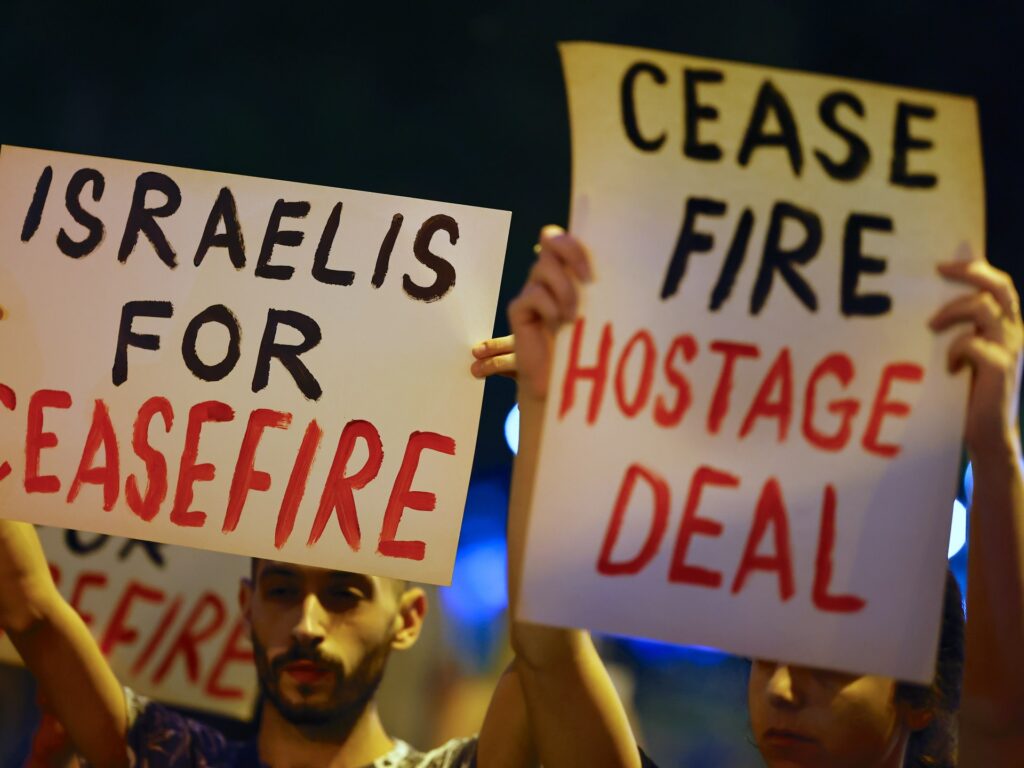On Monday, a peace activist from Beersheba in southern Israel learned that his friend, Khalil Abu Yahia, a resident of the war-torn Gaza Strip, had been killed in an Israeli airstrike.
“He was one of the organizers of the Great March of Return,” said Yossef Mekyton, visibly shaken and moved, referring to the pro-Palestinian protests organized from March 2018 to December 2019 along the Israel-Gaza border.
“And he was killed along with his entire family.”
Mekyton, an Israeli citizen, has long supported Palestinian rights.
But since the events of October 7 – when Hamas fighters crossed the Gaza-Israel border, killing some 1,400 Israelis and sparking unprecedented bombing of the Palestinian enclave – Mekyton says many militants based in Israel live in a climate of “fear”. .
“I think one of the most effective ways to commit suicide these days in Israel is to go out into the street with a Palestinian flag,” the graphic designer told Al Jazeera.
While the treatment of activists seemed menacing before October 7, it is “much more menacing” now, he said.
Israeli Prime Minister Benjamin Netanyahu has vowed to destroy Hamas – which has controlled the impoverished Gaza Strip since 2007 – following the group’s incursion and wave of kidnappings.
But Israel’s relentless bombing of Gaza has killed 8,500 Palestinian civilians, including more than 3,500 children.
Israeli troops say the dead include several Hamas commanders. The Palestinian group has not yet announced the death of its fighters.
As fighting raged on Wednesday, the Israeli army struck the Jabalia refugee camp in northern Gaza, a day after bombing the site for the first time, killing dozens of Palestinians.
Fear and panic have gripped most segments of Israeli society following the Hamas attacks, making the activities of Israel’s militant population more visible than ever.
“I am being harassed by people on social media,” said Israeli Ofer Neiman, a pro-Palestinian Jerusalem resident and supporter of the Boycott, Divestment, Sanctions (BDS) movement, which advocates to exert political and economic pressure on Israel to end the occupation of the Palestinian West Bank and the blockade of the Gaza Strip.
“Is it going to get worse?” Yes, maybe – that’s concerning.
On October 28, dozens of Israelis participated in an anti-war protest in Tel Aviv – widely considered a liberal city.
“As for protesting, I would feel reasonably safe at the Tel Aviv protest. But in other places, like Jerusalem where I live, I wouldn’t feel safe,” Neiman said.
Right-wing voices “dominate” the discourse
Last month, Israel Police Commissioner Kobi Shabtai warned that there would be “zero tolerance” for national rallies in support of Gaza.
But there are signs of repression that go beyond the protests.
Jewish Israeli sociolinguist Uri Horesh recently announced that he had been suspended from his professorship at Israel’s Achva University College, citing his opposition to attacks on Gaza as the reason for his dismissal.
Israel Frey, an ultra-Orthodox Israeli journalist, was forced into hiding after expressing support for the people of Gaza – which he said made him a target for far-right activists.
And it was reported that an Israeli citizen was arrested over a publicly displayed sign.
“There is no sanctity in an occupied city,” read the sign that would have hung in the window of his Jerusalem home for years.
Jerusalem: 10 police officers broke into the home of an Israeli activist, arresting him for a year-old sign he hung in the window, saying “there is no sanctity in a occupied city” (it sounds better in Hebrew).
A new stage in the repression of critical voices– Haggai Matar (@Ha_Matar) October 25, 2023
“The (dominant) voices we hear (in Israel) are either right-wing voices in favor of genocide or mainstream voices in favor of war, maybe not always with genocidal language, but always in favor of bombing of Gaza,” Neiman said of the dominant party. mood in Israel.
Neta Golan, a pro-Palestinian Israeli activist and active member of Israelis Against Apartheid, said Hamas’ attack on southern Israel — while painful — has not dampened her spirits.
“But that doesn’t mean we don’t feel for those (Israelis) who were affected or for the families of the hostages,” the veteran activist said in Nablus, in the occupied West Bank.
Golan claims she has “been arrested more times than I can count” by Israeli authorities for her activism in the past.
His group sent a letter Wednesday to Karim Khan, prosecutor of the International Criminal Court, demanding “accelerated action against the escalation of Israeli war crimes.”
“We really hope that all civilians around the world will return home, whether it’s Israelis returning to their families or Palestinians returning to their country from which they were expelled (when the Israel) in 1948,” she said.
Tali Shapiro, another Israeli activist based in the occupied West Bank – in Ramallah – also says she did not question her long-held pro-Palestinian beliefs after the events of October 7.
“What that prompted me to do was call my parents in the south (of Israel) to make sure they were OK,” Shapiro told Al Jazeera. “And to open my account (on X) to search for my Gazan friends because obviously (we knew where) this was leading us. »
For Mekyton, the conflict reinforced his commitment to continue campaigning for Palestinian rights.
“But it also makes me feel weakened,” he said. “I feel so helpless right now – but I feel like I want to do something. I hope this contradiction will be resolved one way or another.

